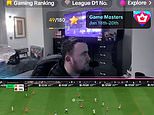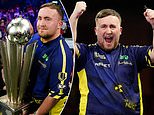Faced with a diagnosis of an incurable, life-threatening condition, for some the answer to their prayers can come in the form of a clinical trial – and the chance to try a new drug.
More than a million people participate in clinical trials each year in the UK, with over 6,000 trials taking place in England alone.
'Every time someone receives a new treatment, it's because of the people who took part in research,' says Professor Lucy Chappell, chief executive of the National Institute for Health and Care Research (NIHR), one of the UK's biggest research funding bodies.
Details of current UK studies and how to apply are listed on the NIHR web page – you can also talk to your GP about taking part in a trial.

Bear in mind that you could be placed on the placebo arm of a trial, receiving a dummy treatment – not the active treatment.
But there are benefits to simply being part of a trial such as additional scans, tests and monitoring that all participants receive.
Here, four people share their incredible experiences of clinical trials that not only saved their lives but made discoveries that could benefit thousands of others.
I WAS GIVEN ONE YEAR TO LIVE
Hasna De Four, 50, a former teacher from London, has three children and a granddaughter.

I was just 31 when I was diagnosed with breast cancer in 2006. I felt a lump in my right breast while breastfeeding my second son, Nel. It was a complete shock. I went into fight or flight mode, because I had to survive for my children.
I had chemotherapy, a lumpectomy [to remove the lump] then radiotherapy – I moved into my mum's; sharing a room with my sons while being so ill was very hard.
I got the all-clear, but in 2010 I was devastated when a routine mammogram found the cancer had returned, to my left breast.
Gene testing found that I have the faulty BRCA1 gene, raising my risk of breast and ovarian cancers, so I chose to have a double mastectomy and reconstruction.
But in 2016 I began experiencing chest pains, which gradually got worse, and had a visible lump in my chest. A CT scan showed I had secondary breast cancer, in the cavity separating my lungs from my chest. It was stage 4 – I was told it was incurable.
My oncologist said without treatment I'd only have one year to live, but I might be suitable for a trial at the Royal Marsden Hospital. I was desperate to try something. That was seven-and-a-half years ago – I've been on three trials since.
For the first trial, Keynote-355, in December 2017, I received chemotherapy plus either immunotherapy (pembrolizumab) or a placebo. It was a blind trial, so I didn't know which I'd got.
At first my blood tests and scans remained stable so I was convinced I'd had the immunotherapy. But by October 2018 a scan showed the disease had progressed – I was getting short of breath, finding it harder to walk around, and had chest pains so I then assumed I was on the placebo arm: I was.
I was quickly moved off the trial and in 2018 joined the PlasmaMATCH trial – combining a drug called olaparib which stops proteins that help cancer cells repair themselves, with ceralasertib, which targets a protein called ATR. (There was no placebo arm.)
Nearly two years later scans showed the cancer was growing again and I was given chemotherapy instead, but by the December the cancer was still progressing.
So in January 2021 I joined the Pavement trial, for patients with advanced breast cancer. All of us were given the drug palbociclib, which blocks proteins that stimulate cancer cell growth, as well as immunotherapy (avelumab). After a year my cancer had shrunk slightly, the lump in my chest had gone and the chest pain disappeared. Just last week I found out it had shrunk slightly again – which I was over the moon about.
You're only allowed the avelumab for two years, so now I only take the targeted drug. This can make me weak, tired and cause mouth ulcers. The immunotherapy also damaged my thyroid so I need thyroid medication for life.
But overall, it's helped my cancer – and I'm grateful. I've become good friends with a woman I met on the Pavement trial.
She was on it for 14 months, but then her disease progressed. It's so sad that something can work for me but not for someone else.
I've been as poorly as she is now, so I keep telling her that it can get better. Sometimes I feel guilty that I'm stable but someone else isn't.
I've been in her position – some of the people I met on the previous trials are still doing well on them. There were times I felt angry that those treatments didn't help me, but I've always tried to be positive and look to what I could try next.
Even if the Pavement trial treatment stops working I know there will be other clinical trials in the future.
I have also donated tissue from my chest wall to help other research – it's important to me to help other people.
When you're told you only have a year left, you'll do anything to survive. I've seen so many people die from cancer, but thanks to the trial I can see a future.
And last year my granddaughter Ayla was born – I never thought I'd live to become a grandmother. Even if you're living with stage 4 cancer, there's hope.
DOCTORS THOUGHT I WOULDN'T REACH 30
Adam McCusker, 41, a learning support assistant, lives in Ammanford, Wales, with partner Gabby, 31, a retail manager, and stepson Dylan, seven.

My childhood was a blur of hospitals, doctors and nurses after being diagnosed at the age of four with cystic fibrosis (CF) – where sticky mucus builds up in your lungs and digestive system.
I was in hospital four or five times a year with lung infections – and in isolation wards for two weeks at a time because of infection risk.
I was scared and alone – I remember a doctor telling my mum I should make memories now as I wouldn't live past my 20s. Knowing I wouldn't have a long life was always on my mind.
By 30, I was too ill to hold down a job – and my lung function [45 per cent compared with 80 per cent for a healthy person] was getting worse. I couldn't talk for more than a few minutes without getting breathless and was told I might need a lung transplant.
This is risky – a friend died aged 17 after suffering organ rejection following a lung transplant.
But I was also afraid I'd die waiting for one. By 2015 my lung function was down to 40 per cent. Then I was invited to join a trial of a drug, Symkevi, at University Hospital Llandough in Cardiff, where I was being treated.
It contains drugs (ivacaftor and tezacaftor) that target a protein damaged in some people with CF.
I started taking it in September 2015. It didn't improve my lung function dramatically but stabilised my health.
A year later I was offered Kaftrio, containing a third drug, elexacaftor. I became the first CF patient in Wales to take it, in December 2016 – within hours I could take a deep breath and feel the air in my lungs for the first time, which was surreal.
My cough disappeared – within a few months I could walk a mile and cycle five miles without getting breathless. I've since been on trials of improved versions of Kaftrio. In August 2020 Kaftrio was approved for NHS use.
The effect has been incredible – now I only need a hospital stay once or twice a year and in April I started working at a local college. My lung function was 72 per cent last year, which is amazing.
I don't think I'd be here without Kaftrio. I've gone from thinking I wouldn't see my 30s to being in my early 40s, potentially with decades left.
HE WOULD NOT HAVE LIVED BEYOND ONE
Charlotte Doyle, 37, a cleaner, lives in Maidstone, Kent, with partner Luke, 38, an electrician, and son, Albie, 12.

Albie seemed fine when he was born, despite weighing just 5lb, but alarm bells started ringing when he hadn't gained weight a few weeks later.
He constantly had sickness and diarrhoea during feeding, which midwives said was reflux, but I knew something wasn't right. His legs and arms were the width of my thumbs and he had a swollen belly. When he was five weeks old, our GP referred him for tests, which came back normal.
As he didn't have enough energy to feed, doctors tried feeding him through a tube – but he screamed in pain and brought it all back up. It was terrifying seeing him wasting away.
He was transferred to Evelina London Children's Hospital, where he was given a total parenteral nutrition (TPN) feed directly into his bloodstream via a vein under his armpit, bypassing his gut. It contained the broken-down forms of all the nutrients he needed.
Tests showed he had a rare condition, Wolman disease – only one or two children in the UK are diagnosed with this every year and don't normally live beyond one. The news was devastating.
The condition meant Albie was missing an enzyme that helps to break down food, so this was being stored as fat in his liver, gut and spleen – which explained his swollen belly. These organs were three times the normal size.
It turned out that Luke and I carried the faulty gene responsible. Then there was a tiny glimmer of hope – the consultant learned of a trial for Wolman disease at Manchester Children's Hospital.
The drug, sebelipase alfa, a synthetic version of his missing enzyme, was given via a drip: the trial didn't have a placebo arm.
The trial had shown that six out of nine children survived for more than one year, and a further trial testing the same treatment showed that eight out of ten children survived past one year.
We moved from Kent to Manchester for Albie to have the weekly treatment. After a couple of weeks, his little arms and legs were getting fatter – it was amazing. After a month, his liver and spleen had halved in size.
By six months old, Albie was no longer underweight.
We met another family on the trial, when Albie was about one which was lovely, if unexpected given how rare the condition is.
Their child was younger than Albie so it must have been reassuring for them to know that a child with the disease could survive as long as he had.
The doctors started to reduce the TPN and increased his milk intake. The treatment helped him process the food better, but he continued to have some sickness and diarrhoea. He was discharged at 11 months old – after this, I administered a special feed into his belly button via a tube.
We were thrilled when he reached his first birthday – every day seemed like a blessing.
Albie started school with other children at four – he could eat certain foods normally, although in very small quantities, but he was on a practically zero-fat diet (no more than 5g a day) as this caused stomach pain and diarrhoea.
He was much smaller than his friends, but otherwise his development was normal.
Although no longer on the trial, he was still being given the enzyme replacement therapy.
At ten, he was deemed healthy enough to be offered a stem cell transplant to replace the missing enzyme using stem cells.
These cells, taken from donated umbilical cord, have the ability to turn into other cells in the body.
Although there were risks – transplants can be rejected and the chemotherapy he had to have beforehand to kill off his own stem cells, was intense – we knew it would give him the best chance.
We didn't want him to need special feeds at secondary school. His growth would also improve as he'd be able to consume more fat.
Now Albie's like a new child. His gut's normal, he can eat anything – he loves a roast chicken dinner – and he stopped the enzyme therapy earlier this year.
I never imagined we'd get here – he really is our miracle. He loves football, has a good social life and is a very happy child.
Last November, the enzyme replacement therapy became the first treatment available for Wolman disease on the NHS.
It's brilliant knowing Albie has helped others with this condition.
NOW I SHOULD LIVE LONGER THAN MUM
Terri Williams, 59, a tax director, lives in north London and has two grown-up children.

I'll never forget how my mum looked – so thin and fragile – when she died and always feared ending up that way. She and my aunt both passed away shortly before they turned 60 due to end-stage kidney failure caused by polycystic kidney disease (PKD), a genetic condition that causes cysts on the kidneys. It's incurable – although treatment can slow disease progression.
I found out I had PKD during a pregnancy scan for my son in 1994. It was very tough to hear. The condition didn't impact me at first – but it was only a matter of time.
So when, in 2008, a specialist covering for my usual consultants told me about a trial at the Royal Free Hospital in London for a new drug to slow the progression of PKD, I Immediately said yes. The drug, tolvaptan, blocks a hormone, vasopressin, which promotes the growth of kidney cysts.
I'd have been fine about being put on the placebo arm of the trial – as if it did work, you had helped in your own way to make the world a better place for
PKD patients. Given there was nothing other than dialysis at the time, I was excited to be at the forefront of any new discovery.
I was among 1,445 people to join an international trial for the drug – we had to take three tablets every morning and one in the afternoon, which we could take at home. The trial showed that in patients taking the drug their kidney function declined more slowly than those taking a placebo.
The earlier you start, the better the result – so having this in my early 40s meant I really slowed down the progress of my disease. My glomerular filtration rate (GFR) – a measure of how well the kidneys filter waste and excess water – is currently 43; it would be 90 and over in someone without PKD (a reading of 15 means severe kidney disease).
The drug does make you very thirsty – I drink about eight litres of water every 24 hours and need the loo a lot.
The trial lasted three years – afterwards I took part in an extension trial, until it was approved on the NHS in 2015.
I still take it every day. As tolvaptan is given only in the early stages of the disease, there's a good chance my kidney function would have deteriorated too far for me to meet the criteria by the time it was approved for NHS use, if I hadn't been on the trial.
Now I work full-time, travel and go to the theatre but I wouldn't be living such a normal life without the drug.
And I'll be 60 next month – an age neither my mum nor my aunt reached.
bepartofresearch.uk












